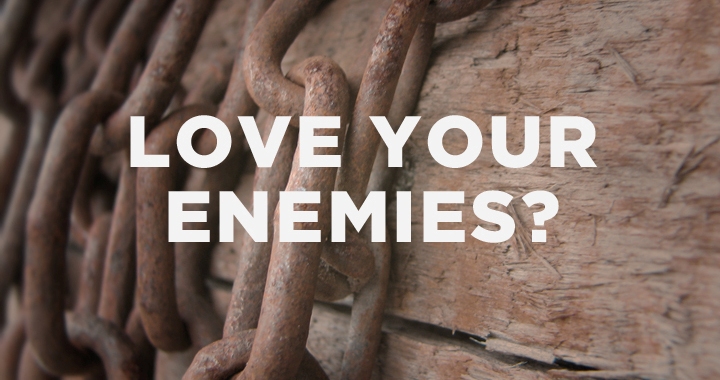I was looking online for some graphics about love I could use for a project on which I’d been working. I came across pictures of bumper stickers and posters that contain the words of Jesus, “Love Your Enemies.” I was struck with the variety of ways the words were used. For the most part a second sentence was added to qualify, or even undercut, the intention of the Lord. Some of these tried to clarify what Jesus was saying. Most were meant to be humorous. A few directly contradicted the aim of Jesus’ words. All of them missed the mark in some way.
Here are a few examples.
“Love Your Enemies…It Pisses Them Off” or “…It Makes Then So Damn Mad” or “…Nothing Annoys Them So Much.” No doubt these lines are supposed to be funny. But in fact they diminish the love Jesus called for by delighting in the negative response some people might have when they are greeted with unexpected love. Such statements infer that the very aim of loving those at odds with us is to strike a blow against them, albeit of an unconventional sort. Yet the love that Jesus advocated was not some sort of unconventional blow but a blessing.
Jesus immediately used words like “do good, ” “bless” and “pray for” when he told his followers to love enemies (Luke 6:27-28). Sure, it will undoubtedly astonish people when their attacks are not with the same. But the point of this love is not to “mess with their minds” but to touch their hearts. As we walk with Jesus we are to enrich the lives of the people around us with the love we have received from God. We very well may “piss off” or “annoy” or make some “so damn mad.” Certainly scripture teaches that doing good to enemies “will heap burning coals on their heads” (Romans 12:20). But we don’t love with such a response being either our aim or desire.
Far worse is the bumper sticker that reads, “Love Your Enemies…But Keep Your Gun Oiled.” The meaning of that particular message seems to be one of several related possibilities, none of which have anything to do with following Jesus. (1) “Love Your Enemies…Not Really!” (2) “Love Your Enemies…But Only as a State of Mind, Not Action.” (3) “Love Your Enemies…But Prepare to Harm Them in Case They Threaten You.” Whatever “love” means to those who designed and display this bumper sticker, their definition ignores the teachings and life of Jesus. Instead, violence-trusting values are promoted.
The one variation that I found most commendable says, “Love Your Enemies…I’m Pretty Sure That Means Don’t Kill Them.” And I’m pretty sure that it means at least that much. Doing no harm is a decent start. But love is certainly more. It is not just refraining from deliberately causing injury or death. It is to will and to work for the good of another. Love works for right relations, wholeness and harmony. Bridge-building, not wall-building, reconciliation, not annihilation is the work of love (2 Corinthians 5:14-20). Love is kind and is not self-seeking even when faced with an enemy (1 Corinthians 13: 4, 5).
All this starts with prayer. As our Lord taught, we are to pray for those who abuse us (Luke 6:28). Roman Catholic peace activist John Dear recently offered these wise words: “In prayer, we feel the infinite love of God and are stirred to love ourselves and others, even our enemies. We give God our inner violence and resentments, our hurts and anger, our pain and wounds, our bitterness and vengeance. We grant clemency and forgiveness toward those who have hurt us and move from anger, vengeance and violence to compassion, mercy and nonviolence.” In prayer the sense we have of God’s embrace is renewed and we are moved to pass it on to all others, whether they love us or not.
One bumper sticker that I didn’t see was one that says, “Love Your Enemies…Though It Might Get You Killed.” Such a message doesn’t stroke our naïve idealism but it does reflect biblical realism. Offering love to enemies doesn’t guarantee a pleasing outcome. Jesus never promised such love would “work” as a strategy to win their friendship and create peace. While we are to “live peaceable with all” (Romans 12:18), such behavior might leave us more vulnerable to those with harmful intentions. Nevertheless, this is the way of Jesus: “Christ also suffered for you, leaving you an example, so that you should follow in his steps…. When he was abused, he did not return abuse; when he suffered, he did not threaten” (1 Peter 2:21, 23).
Bumper-stickers won’t teach us what it means to love enemies. That is the sort of lesson we can learn only by paying attention to how Jesus loved his own enemies, whether they were personal enemies or enemies of his nation. There was no covert viciousness or overt violence in his love. He loved enemies with compassion, mercy and truth…all the way to the cross. And from there he said, “Father, forgive them” (Luke 23:34).
—
Craig M. Watts is the minister of Royal Palm Christian Church (Disciples of Christ) in Coral Springs, Florida and Co-Moderator of Disciples Peace Fellowship. He authored the book (Doulos Christou Press: Indianapolis, 2005) and his essays have appeared in many journals such as Cross Currents, Encounter, the Otherside, DisciplesWorld and more. Craig blogs on the Disciples Peace Fellowship’s, “Shalom Vision.”

